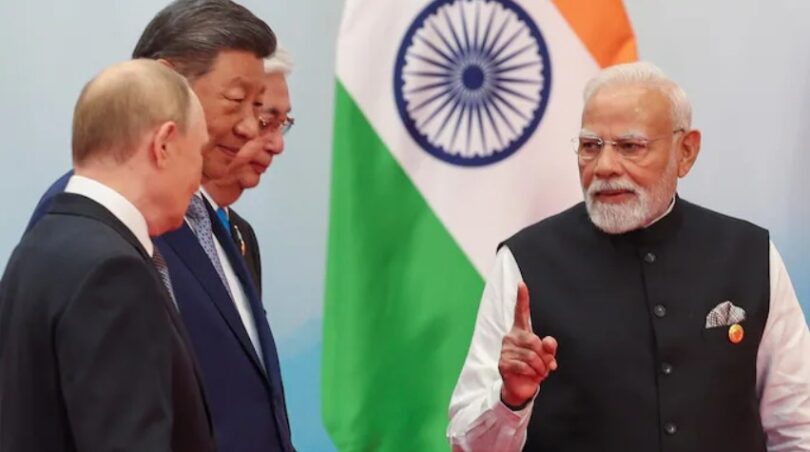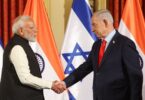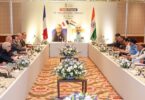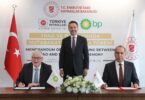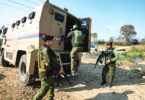The 25th SCO Summit, held in Tianjin on September 1, 2025 under the chairmanship of China’s President Xi Jinping, was attended by Heads of States of Belarus, India, Iran, Kazakhstan and Uzbekistan. Both the SCO Secretary General plus the Director of the Executive Committee of the SCO Regional Anti-Terrorism Structure also attended. Overall, some 20 countries were represented at the SCO Summit.
Modi did not attend the SCO Summit in Astana, Kazakhstan in 2024 and held the previous one as rotatory Chairman on-line, not in-person. His decision to attend the SCO Summit in Tianjin was obviously pushed by the POTUS Donald Trump’s massive tariffs against New Delhi, including the attempt to invade India’s farm sector that constitutes a major vote bank for Modi. Indian media had reported earlier that Russian President Vladimir Putin would be visiting India for a dialogue with Prime Minister Narendra Modi, after which both Modi and Putin will travel for the SCO Summit in Tianjin. However, Modi instead travelled to Japan and then to China – was this meant to be a signal for Xi?
Chairing the Summit, Xi criticised the bullying behaviour in the world and said, “The shadows of Cold War mentality, bullying, are not dissipating, and there are new challenges that are increasing, not diminishing.” He proposed a Global Governance Initiative (GGI), calling on countries to work in concert for a more just and equitable global governance system adhering to sovereign equality, abiding by international rule of law, practicing multilateralism, advocating people-centric approach, and focusing on taking real actions. Xi said his goal of China's cumulative trade with other SCO countries exceeding USD 2.3 trillion was achieved ahead of schedule, multi-dimensional connectivity network has been further improved, with nearly 14,000-km international road transport routes opened between member states and over 110,000 China-Europe freight trains running. He further said SCO is already the largest regional organization with 26 countries participating, cooperation in more than 50 fields, and a total economic output of nearly USD 30 trillion.
The Summit witnessed productive discussions on the SCO Development Strategy, Reform of Global Governance, Counter-Terrorism, Peace and Security, Economic and Financial Cooperation, and Sustainable Development.
Addressing the Summit, PM Modi focussed on strengthening SCO cooperation through security, connectivity and opportunity; emphasising that peace, security and stability remain key to progress and prosperity. He called for firm, coordinated and decisive action to fight terrorism in all its manifestations, as well as terror financing and radicalization. He thanked the member countries for condemning the Pahalgam terror attack, urging that countries who perpetrate and support cross-border terrorism be held accountable. In terms of connectivity, Modi said India strongly supported projects like Chabahar Port and International North-South Transport Corridor. He also spoke about opportunities in the fields of start-ups, innovation, youth empowerment and shared heritage, under the SCO and proposed a ‘Civilizational Dialogue Forum’.
At the SCO Summit, Putin blamed the West for igniting the war in Ukraine, saying, “This crisis was not triggered by Russia’s attack on Ukraine, but was a result of a coup in Ukraine, which was supported and provoked by the West.” He said Western efforts to draw Ukraine into NATO were a key driver of the war, reiterating that Russia’s security concerns must be addressed before any peace deal can be reached. “For the Ukrainian settlement to be sustainable and long-term, the root causes of the crisis must be addressed,” Putin said. He highlighted his Alaska summit with Trump as “opening a way to peace” and praised China and India’s diplomatic efforts, saying these could “facilitate resolution of the Ukrainian crisis”.
24 documents were approved at the Summit, including the Tianjin Declaration (full text of which has not been released yet), Statement in connection with the 80th anniversary of the end of World War II and reforming the United Nations, as well as a number of thematic statements. Key documents included the Tianjin Declaration and SCO Development Strategy until 2035, with others related to topics like: countering extremist ideology; energy cooperation; resolutions for granting dialogue partner/observer status to Lao and Commonwealth of Independent States (CIS); approval of SCO activities over the past year: report of SCO Regional Anti-Terrorist Structure activities in 2024; SCO Anti-Drug Centre and Universal Centre for Countering Security Challenges and Threats; strengthening cooperation in digital economy; cooperation on sustainable energy development and green industry; cooperation in Artificial Intelligence; supporting multilateral trading system; combating drugs; scientific, technical, and innovation cooperation; investment cooperation in sustainable development.
Following the Heads of States Summit, a ‘SCO Plus- meeting was held on ‘Turning Multilateralism into Action, Ensuring Regional Security, and Promoting Sustainable Development’; attended by leaders of member states, observer state Mongolia, dialogue partners Azerbaijan, Armenia, Cambodia, Maldives, Myanmar, Nepal, Turkey, Egypt, guest of the chairing side Turkmenistan, Indonesia, Laos, Malaysia, and Vietnam, as well as heads of executive bodies of the UN, SCO, CIS, ASEAN, CSTO, EEC, CICA, ECO, AIIB.
The Tianjin Declaration focused on strengthening the Global South amid global uncertainties in trade and a fluid and chaotic global situation; stating that the world was undergoing profound historical changes that affect all spheres of political, socio-economic, and social relations. The member states also opposed unilateral coercive measures, including those of an economic nature that contravene the United Nations charter and principles of the WTO.
Taking note of Israel’s ongoing war on Gaza and the catastrophic humanitarian situation engulfing the Gaza Strip, all the member states expressed “deep concern” and strongly condemned “actions that have led to numerous casualties among the civilian population” in the enclave. A “comprehensive and just settlement” of the Palestinian issue is the only way to ensure peace in West Asia, the declaration said. India joined SCO members in condemning the Israeli strikes on Iran’s nuclear facilities. At the same time, India was the only SCO member that did not back China’s BRI.
The Declaration reaffirmed SCO’s firm commitment to fight against terrorism, separatism, and extremism, stressing the inadmissibility of attempts to use terrorist, separatist, and extremist groups for mercenary purposes. But while the Pahalgam massacre was condemned, so were the attacks on Jaffar Express and Khuzdar in Pakistan, for which Pakistan blames India. For that matter, the Pahalgam massacre was already condemned by the whole world, with calls to bring the perpetrators to justice, but none blamed Pakistan other than Israel. To this end, it would be naïve to expect China and the US to stop supporting Pakistan, since terrorism has become a currency for power.
The SCO chairmanship for 2025–2026 has passed to the Kyrgyz Republic. The head of Kyrgyzstan named the theme of the Kyrgyz chairmanship as “25 years of the SCO: together for a stable world, development, and prosperity”.
The Modi-Putin bonhomie was on display at Tianjin, with Modi also travelling in Putin’s car for the Summit. And why not, with Russia being India’s most trusted partner through the decades. But not so with Xi, who sported more of an amused look, perhaps thinking Modi may not have come for the Summit if Trump had not targeted India with tariffs. If this were not the case, there would have been a Russia-India-China (RIC) Summit conveying a strong signal to the US. There is also speculation, whether Modi wanted such a RIC summit at this juncture? Despite the US-India war of words, India participated in a 2+2 Dialogue with the US, India troops are participating in a joint exercise ‘Yudh Abhyas’ with US troops in Alaska, and a billion-dollar deal is reportedly in the offing for importing aero-engines from the US.
Finally, Xi would have loved Modi to attend the massive parade on September 3 being attended by Putin and Presidents of Iran and North Korea among dozens of other dignitaries. This would have sent a very strong signal to Trump but Modi couldn’t have stayed on, knowing India is stuck between two bullies – China and the US. Did Xi sense this as a wrong signal by Modi?
The author is an Indian Army veteran. Views expressed are personal.


